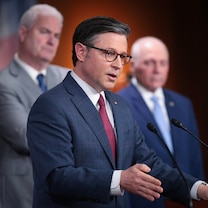Candidates Outline Iraq Plans on War Anniversary
Candidates for '08 seek to define their Iraq strategies on war's anniversary.
March 19, 2008 — -- In a presidential election campaign that could turn this fall into a referendum on the Iraq War, the three '08 candidates have seized on the war's fifth anniversary to outline their Iraq plans and to try to draw contrasts with one another's policies.
Despite some recent success in keeping violence in Iraq from surging to previous levels, the ongoing wars in Iraq and Afghanistan, going into a sixth year, is the second biggest issue for primary voters after the economy.
With the issue threatening to define their candidacies, soon-to-be Republican nominee Sen. John McCain of Arizona visited Iraq this week to emphasize his commitment to keeping U.S. troops in the country to secure it.
Meanwhile, the dueling Democratic candidates -- who largely agree on pulling troops out of Iraq -- both planned speeches designed to draw distinctions between their plans, while framing McCain as a continuation of a failed Bush administration war strategy.
In a speech on Iraq today in North Carolina, Illinois Sen. Barack Obama outlined what his advisers called a "strategic vision for our country."
"It's time to turn the page on a failed strategy and a fundamentally flawed ideology," Obama said, outlining his plan to withdraw U.S. forces from Iraq on "Day 1."
"Senator Clinton says that she and Senator McCain have passed a "Commander in Chief test" – not because of the judgments they've made, but because of the years they've spent in Washington," Obama said.
"She made a similar argument when she said her vote for war was based on her experience at both ends of Pennsylvania Avenue. But here is the stark reality: there is a security gap in this country – a gap between the rhetoric of those who claim to be tough on national security, and the reality of growing insecurity caused by their decisions."
Blasting his Democratic rival, Obama asked: "Who do you trust to end a war -- someone who opposed the war from the beginning, or someone who started opposing it when they started preparing a run for president?"
Obama contrasted his Iraq plan with that of McCain, noting the invasion of Iraq was a fundamental strategic misstep, and in a swipe at the presumptive Republican nominee, argued no amount of great tactics can make up for a failed strategy.
Obama emphasized his proposals to not just have soldiers, Marines and the Air Force fighting terrorism but to tap other government agencies and the creation of a civilian expert reserve corps to "integrate the elements of our national power."
"We cannot place the burden of a new national security strategy on our military alone. We must integrate our diplomatic, information, economic and military power," he said, proposing an additional $1 billion in non- military assistance for Afghanistan each year.
"I will invest in our civilian capacity to operate alongside our troops in post-conflict zones and on humanitarian and stabilization missions. Instead of shuttering consulates in tough corners of the world, it's time to grow our Foreign Service and to expand USAID. Instead of giving up on the determination of young people to serve, it's time to double the size of our Peace Corps. Instead of letting people learn about America from enemy propaganda, it's time to recruit, train, and send out into the world an America's Voice Corps," Obama said.
In his speech Thursday in West Virginia, Obama will outline how the Iraq War has contributed to the country's economic woes and how the Bush administration's economic policies have left the country more vulnerable to national security threats.




